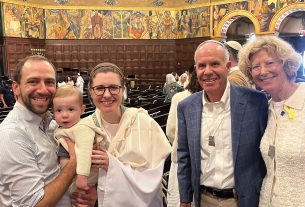If you’re starting college soon, congratulations! I hope it’s eye-opening, mind-expanding, brain-sharpening, soul-stretching, character-building and FUN. But beware. Unless you take charge, your campus debut will disappoint.
Today’s college orientation programs prove just how modern universities lost their way. The University of South Florida Official Admissions Blog suggests “a few questions you might bring” – the word “bring” evokes consumer goods not thought-provoking queries good for brains or souls: “What support services are available if I struggle academically? How do I get involved in student organizations or leadership roles? What should I know about campus safety? What are some common first-year challenges and how do students overcome them?”
Sallie, the “first educational solutions company,” offers “college orientation tips you can’t live without,” including: “research courses” – makes sense – “Pack a comfortable pair of shoes … Bring a refillable water bottle … and “Eat a healthy breakfast,” while advising parents to “attend the orientation in person,” even “if your son or daughter” squirms.
Finally, over the last decade, many orientations degenerated into Woke U Boot Camps. In 2022, Speech First’s “Freshman Disorientation Report” noted that “only around 30%” of 51 leading universities “mention free speech or viewpoint diversity (30% and 33%, respectively) in their orientation programs, while 91%” push Diversity Equity and Inclusion. Most antiracism and sexism-awareness workshops students endured were heavy-handed. One University of North Carolina student reported in 2015, “Instead of showing that all people are equally deserving of human dignity,” the exercises caricatured a series of “villains” who were “either white, male, heterosexual, middle class or some combination of the four.”
Over the last decade, many orientations degenerated into Woke U Boot Camps. A 2022 report noted that “only around 30%” of 51 leading universities “mention free speech or viewpoint diversity while 91%” push Diversity Equity and Inclusion.
In 2003, Shippensburg University students encountered a code proclaiming that Shippensburg’s “commitment to racial tolerance, cultural diversity and social justice will require every member of this community to ensure that the principles of these ideals be mirrored in their attitudes and behaviors.”
Unless you’re proactive, you risk being propagandized into becoming what my book on the Academic Intifada called “rampaging snowflakes.” Clearly, students should learn about resources offering academic and psychological support, avoid toxic behaviors, and get practical advice. Moreover, orientation should introduce you to fellow students, tour you around campus, and help you navigate the bureaucracy, to facilitate picking courses, clubs and comrades – the three “c”s central to successful campus living.
But never forget “the why” – which most universities neglect. College orientations should help students learn about their university, each other, and, most important, themselves. Universities should offer guided discussions with professors and older students about their educational mission to help first-years clarify their goals. Only by knowing where you’re going — or where you hope to get — can you figure out what path to take.
At a time when so many students demonize those who dare disagree with them, my ideal orientation would start with John Stuart Mill’s 1859 classic “On Liberty,” celebrating the free marketplace of ideas. When I read Mill my first year (admittedly in a seminar on the history of free speech), I recognized Freedom of Speech as the keystone freedom for successful democracies — and to being a good person while living a good life.
“Truth emerges from the clash of adverse ideas,” Mill exulted. That insight repudiates campus cancel culture and the modern educator’s tendency to wrap students in cotton to insulate them from uncomfortable, “triggering” ideas, attitudes, thoughts, realities. Demonstrating how much intolerance suffocates thought, Mill wrote: “To refuse a hearing to an opinion, because they are sure that it is false, is to assume that their certainty is the same thing as absolute certainty. All silencing of discussion is an assumption of infallibility. …” Shutting down others robs humanity of the possibility of learning what might be a corrective to today’s conventional wisdom.
Anyone who truly gets Mill – and Free Speech – won’t dismiss or disdain others because of any differences – of race, gender or creed. Mill urges us to learn from one another, respect one another, and create the kind of liberal democratic community resilient enough to cultivate consensus while tolerating dissent.
This essential approach can launch fresh, fertile, enriching college careers while helping save the university from itself. The Academic Intifada, and the antisemitic anti-Zionism rife on too many – but, beware, don’t exaggerate or overreact, not all – campuses – reflect this broader academic breakdown. I am not arrogant enough to claim that anyone who truly understands John Stuart Mill would never criticize Israel or never support the Palestinian cause. But no true Millian liberal would hesitate to criticize Palestinian terrorism, dictatorship, homophobia, sexism, mass-murder or Jew-hatred. And, certainly, no one who gets Mill would applaud the way professors, administrators, and students targeted, harassed and sometimes attacked Jews, Israelis and Zionists on campus.
Admittedly, no one expects students, in their first week, to revolutionize the university culture. It took years to get derailed by excessive credentialism and job hunger – on the part of students, parents, and administrators alike — mushy psychobabbling, all-or-nothing woke identity politics, the hiring excess administrators, and an institutional gargantuanism more committed to preserving university reputations and budgets than cultivating young minds and souls.
But you can learn from these last few decades’ misfires, and from the strange, self-sabotaging mix of laziness and harshness blinding so many of your fellow students and recent graduates.
Seize the day. Take responsibility for your education and enlightenment. Start reading challenging books while finding fellow students who want to argue with you about them – after actually reading them! Learn from the entrepreneur Malcolm Forbes that “Education’s purpose is to replace an empty mind with an open one,” and from the journalist Sydney J. Harris that “The whole purpose of education is to turn mirrors into windows.”
As you thrive, outgrow the heavy-handedness of your previous educational experiences. Embrace university as an opportunity to unlearn the worst educational habits instilled by our factory-like and now often highly-politicized elementary schools and high schools. And rediscover your inner child, who, as the philosopher Martha Nussbaum rhapsodizes, has a “love of play” and “questioning spirit” that needs “to be strengthened, not crushed.”
Gil Troy, a senior fellow in Zionist Thought at the Jewish People Policy Institute, is an American presidential historian. His latest books, “To Resist the Academic Intifada: Letters to My Students on Defending the Zionist Dream” and “The Essential Guide to October 7th and its Aftermath” were just published.




